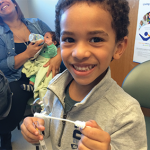Management of pediatric SLE is mostly extrapolated from adult studies, & pediatric studies are limited.
Setting Research Priorities
Dr. Hersh continued by discussing how the pediatric rheumatology community has begun to tackle some of these questions. Through a joint venture of the Childhood Arthritis and Rheumatology Research Alliance (CARRA) and the Lupus Foundation of America (LFA), Dr. Hersh and colleagues conducted a prioritization exercise to define research priorities in childhood-onset lupus.2 By surveying pediatric specialists in rheumatology, dermatology and nephrology, the participants identified several items as priorities for future research.
The findings from the research prioritization survey led to a qualitative study to further explore and define these priorities and identify barriers to addressing them. Semi-structured interviews were conducted with international experts in childhood-onset SLE, and five high-priority items emerged. These priorities include: 1) expanding disease knowledge; 2) the importance of investigator collaboration; 3) partnering with patients and families to improve engagement and include outcomes important to patients; 4) optimization of care and outcomes; and 5) overcoming barriers so that early career investigators remain engaged and able to sustain their research over time. These results were presented at ACR Convergence 2020.3
Dr. Hersh highlighted how these themes are tied together. She then emphasized that patients and their families are at the center of these themes, and the medical research community should make certain that its research priorities align with theirs. Dr. Hersh and her colleagues plan to expand their project to include patient and family interviews to further understand the research priorities of patients and families. With this added information, Dr. Hersh and colleagues hope to create a research agenda to move the field forward.
Investigators are already attempting to address some of the research priorities identified by these studies. Dr. Hersh discussed a recent U.S. Centers for Disease Control and Prevention award that is funding a current project within the CARRA Lupus Registry. The project aims to improve pediatric lupus care and outcomes through understanding the natural history of lupus, treatment, access to care, and disparities in lupus care and outcomes. To date, more than 800 patients are enrolled in the registry, and the investigators are following these patients longitudinally to understand disease trajectories and outcomes. Baseline and enrollment data from the CARRA Lupus Registry was presented at ACR Convergence this year.4
Dr. Hersh concluded her presentation by expressing excitement for the future of pediatric SLE research, while recognizing the many challenges and opportunities. She stressed the importance of research collaboration and expressed hope for future multinational efforts, such as connecting the CARRA registry with similar registries across the world. Finally, the engagement of patients and families is critical, she said, and we need them to be the cornerstone of our work.


